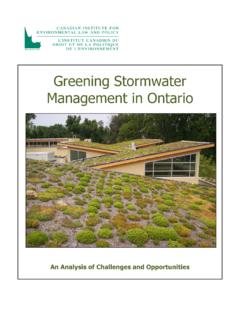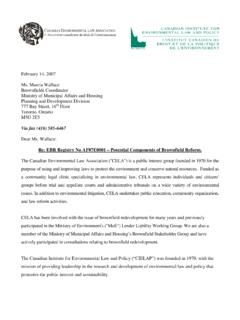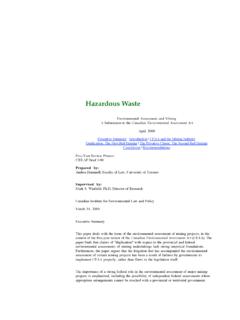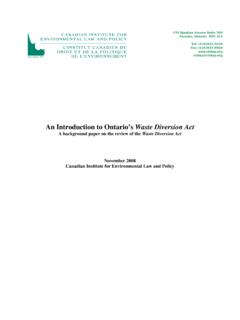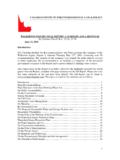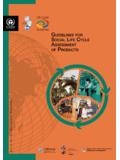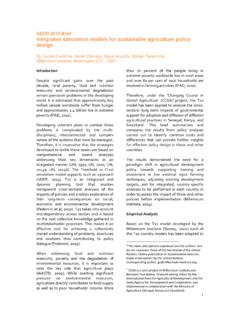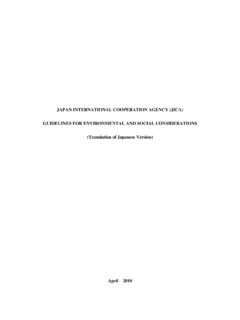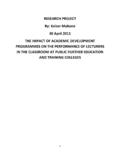Transcription of THE ROLE OF PUBLIC PARTICIPATION IN THE …
1 CIELAP BRIEF ON CANADIAN TRADE ROLE OF PUBLIC PARTICIPATION IN THEIMPACT assessment OF TRADE PROCESSS peaker paper for the impact Assessmentfor Industrial Development IAIA 04 (April 28th 2004, Vancouver)Stella BastidasThe Role of PUBLIC PARTICIPATION in the impact assessment of Trade Process Speaker paper for the impact assessment for Industrial Development IAIA 04 (April 28th 2004, Vancouver) Stella Bastidas1 1) Introduction Democratic governance will be meaningless if governments do not ensure an effective and fully informed PUBLIC PARTICIPATION in decision-making, in particular, in the impact assessment of trade process.
2 Considering the increasing important effects that trade processes, including trade policies and international trade negotiations, have on PUBLIC life, governments need to better take into account PUBLIC PARTICIPATION not only to effectively engage the general PUBLIC , but also to establish a more mutually beneficial government and citizen relationship. 2) Why is PUBLIC PARTICIPATION important? Broad PUBLIC PARTICIPATION is a cornerstone of responsible democratic governance and a fundamental prerequisite to achieve sustainable development. It moves beyond traditional methods of PUBLIC consultations by creating opportunities for the open exchange of ideas, transparency, mutual learning, and informed and representative decision-making a) Benefits of PUBLIC Participation3 - Strengthens Democracy By engaging in the impact assessment of trade process, citizens are encouraged to exercise their democratic rights.
3 As a result, trade process becomes more representative. Openness to the PUBLIC enables citizens to better assess trade process and gain a greater forum in which to present their concerns and cooperate with government. Therefore, insufficient PUBLIC engagement limits the power of citizens to participate in democratic governance. - Increases Accountability PUBLIC PARTICIPATION can contribute to an accounting of the social, economic, and environmental impacts of trade process and of how the costs and benefits will affect different segments of Therefore, PUBLIC PARTICIPATION helps to ensure that governments are accountable for their actions and responsive to PUBLIC interests.
4 By linking the PUBLIC with decision-makers, citizen confidence in and support of trade process is strengthened and trade officials are held responsible for their actions. 2 - Improves Process Quality Meaningful PUBLIC PARTICIPATION allows trade officials to be better informed of different opinions and concerns and ensures that policies and international trade agreements are more robust because they have been tested through a comprehensive process of review and revision before being approved. PUBLIC PARTICIPATION brings not only additional skills, knowledge, concerns, and ideas to the table, but also solutions that might not have otherwise arisen.
5 -Manages Social Conflicts PUBLIC PARTICIPATION can alleviate social conflicts, by bringing different stakeholders and interest groups to the same table to assess the impacts of trade process. Investment in PUBLIC PARTICIPATION at an early stage of the impact assessment can minimize both the number and the magnitude of social conflicts arising over the course of the implementation of the trade - Safeguards against Externalities Active PUBLIC PARTICIPATION can identify environmental and other externalities that might otherwise be overlooked. By paying attention to, for instance, the impact assessment of trade process in advance, PUBLIC scrutiny can prevent future problems from arising.
6 - Enhances Process Legitimacy Meaningful PUBLIC PARTICIPATION in the impact assessment of trade policy and international trade agreements will legitimize the trade process. Without significant PUBLIC PARTICIPATION , citizens may feel manipulated and suspicious, which undermines an effective dialogue and can create distrust. -Protects Business Interests Active PUBLIC PARTICIPATION can protect business interests, by reducing PUBLIC conflict and safeguarding against future risks. PUBLIC protests have sometimes resulted in stock price depressions and market losses. b) Concerns about PUBLIC Participation6 - PUBLIC PARTICIPATION Does Not Represent all Citizens Although PUBLIC PARTICIPATION does not necessarily represent all citizens, an adequate selection process can reduce uneven representation.
7 Therefore, governments must guarantee that participant selection best represents the diversity of PUBLIC views. - Feedback in Decision-Making 3 Governments must structure a PARTICIPATION process where the PUBLIC has the opportunity to follow-up and to know how PUBLIC input will be used to inform decision-making processes. -International Trade Negotiations Require Confidentiality Although international trade negotiations are conducted in secrecy --as a necessary prerogative of nation states-- governments should ensure that the citizen's right to information and PARTICIPATION is not unduly restricted. - International Trade Policy is too Technical The information provided by governments on international trade agreements and policy is often too technical in nature and inadequately explained.
8 Therefore, trade officials should ensure that information on international trade policy be written in accessible language. 3) International, Regional and National Instruments Numerous international and regional agreements affirmed the fundamental principle of PUBLIC PARTICIPATION and have stimulated the development of national-level legal frameworks. a) International Instruments: -Rio Declaration, Principle 10: Principle 10 of the 1992 Rio Declaration7 that emerged from the United Nations Conference on Environment and Development --also known as the Earth Summit--, articulated three pivotal principles that inform the formulation of PARTICIPATION policy and regulations.
9 These principles are: access to information, access to PARTICIPATION and access to justice. Due to the scope of this presentation, I will only comment on access to information and access to PARTICIPATION . -Universal Declaration on Human Rights and International Covenant on Civil and Political Rights It is widely recognized that access to information and access to PARTICIPATION have an ultimately expression as human rights. Article 19 of the Universal Declaration of Human Rights and article 19 of the International Covenant on Civil and Political Rights establish the right to information. Both these texts protect the rights to freedom of opinion and expression, and to seek, receive and impart information through any media, regardless of national boundaries.
10 8 4 Article 21 of the Universal Declaration of Human Rights provided the basic right to PARTICIPATION . -Agenda 21 The United Nations Conference on Environment and Development recognized that the commitment and genuine involvement of all social groups is critical to effectively implement Agenda 21. Furthermore, in the context of the environment, Chapter 23 of the Agenda 21 recognized the need of individuals, groups and organizations to participate in environmental impact assessment procedures and to know about and participate in (pertinent) decisions .9 -The Vienna Declaration The 1993 World Conference on Human Rights adopted the Vienna Declaration.
